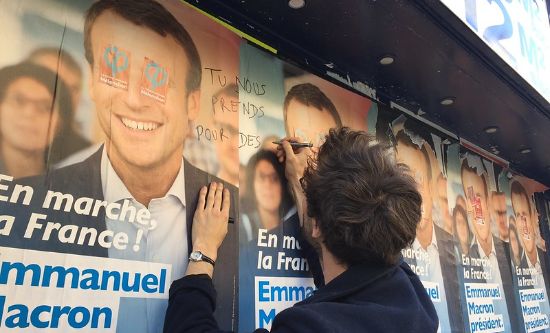
On 24 April, Emmanuel Macron was re-elected President after beating his far-right rival Marine Le Pen of the National Rally in the second round of the French presidential election. Macron won with 58.6% of the votes against Le Pen’s 41.4%. The outcome was more or less a repeat of the 2017 election, when Macron also beat Le Pen, but by a larger margin, 66.1% to 33.9%. The French bourgeoisie was quick to claim victory, as its champion Macron will now occupy office for an additional five-year term. But for the French working class and victims of French imperialism there is nothing to cheer. Whichever candidate won would maintain the pressure on the living standards of the working class and poor.
France is being hit by inflation: the cost of living is rising and annual inflation is running at nearly 5%, while hospitals and health care have not recovered from the Covid-19 pandemic. The election was marked by the lowest turnout (72%) ever recorded since the establishment of the Fifth Republic in 1965. Ipsos Sopra Steria report that while 61% of votes from 18 to 24-year-olds went to Macron, 41% of people in that age group did not vote at all. Macron’s victory margin was narrow among those aged 25-34 and 35-49 and it was only among pensioners that Macron could count on a bedrock of support, with 71% of votes from those aged 71 or over going to the president. Following a campaign to vote ‘null’, 8.6% of the votes cast were either blank or null – the voter having scribbled a protest on their ballot paper.
Better-off sections of the French working class were coerced into voting for a candidate who had not delivered on his promises to revitalise the French economy for fear of the instability that would follow a Le Pen victory. But since 2017, Macron had adopted many measures against the unemployed and the poorest section of the working class, and planned to increase the retiring age from 62 to 65. There were however protests in Paris, Toulouse and other cities because of the absence of real choice in the 2022 election. The French overseas territories, Guadeloupe, la Réunion, Martinique, French Guiana, Saint Pierre and Miquelon, and St Martin and Saint Barthélemy all showed a majority for left wing candidate Jean Luc Melenchon in the first round. Come the second round, the overseas electorate switched its votes for the far-right candidate as a protest vote against Macron’s government. The poor in general voted for Le Pen in the second round: 57% of those earning less than 1,250 euros per month voted for her; in contrast, 64% of those earning more than 3,000 euros a month voted for Macron. It was a case of anyone but Macron for those who had voted initially for Melenchon.
As the world watched the election unfold, the western liberal press hastily sided with Macron depicting him as the last rampart to the rise in far-right populism. On foreign affairs, the two candidates have very contrasting views on the position France should take in the Russia-Ukraine conflict. Macron has always expressed his support for NATO and always wanted to be seen as the EU’s leading figure alongside former German Chancellor Angela Merkel. Marine Le Pen’s expressed the possibility of leaving the EU and withdrawing French troops from NATO: she conceives of a France able to sustain itself as an independent imperialist power.
But despite differing views on foreign policies in Europe and immigration, both candidates remained committed to carrying on France military operations on Africa. In 2013 French troops were deployed alongside 14,000 UN peacekeepers in West Africa to combat the terrorist threat in the Sahel region. During the 2017 election campaign, Le Pen had given a speech in front of 3,400 French troops in Chad on the importance of maintaining a French presence in West Africa. West Africa is rich in uranium – an important resource for nuclear power. In February 2022 French troops were forced to withdraw from Mali, a former French colony, following a coup against President Ibrahim Boubacar Keita, a close ally of France. The provisional government, a military Junta led by Colonel Assimi Goïta, opposed the presence of French troops in Mali. Relationships between France and Mali quickly soured: thousands of people took to the streets of the capital, Bamako, in protest at the presence of French troops making the continued French military presence untenable.
Neither candidate passed any comments on the Mali situation during their election campaigns. However, it is clear that France will continue its military operations in West Africa. In order to protect French imperialism’s interests in the continent, Macron announced in his campaign that he would increase military spending.
The Parti Communiste Revolutionaire de France, which argued for a boycott of the second round, concluded that ‘What was at stake in this second round…was for the monopoly bourgeoisie to gain the broadest political consensus in support of its class interests.’ Whether the reduced consensus compared to 2017 will be sufficient to avoid serious social conflict in the years of austerity is very much in doubt.
Lewis Zola




